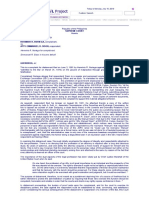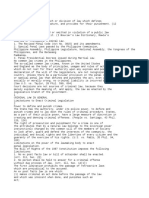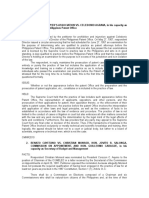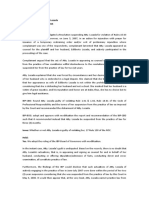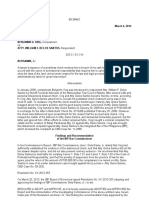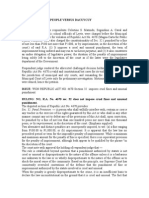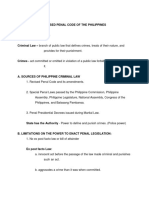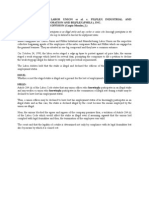Legal Ethics Digests
Legal Ethics Digests
Uploaded by
piptipaybCopyright:
Available Formats
Legal Ethics Digests
Legal Ethics Digests
Uploaded by
piptipaybCopyright
Available Formats
Share this document
Did you find this document useful?
Is this content inappropriate?
Copyright:
Available Formats
Legal Ethics Digests
Legal Ethics Digests
Uploaded by
piptipaybCopyright:
Available Formats
RUFINO R. TAN vs. RAMON R. DEL ROSARIO, JR., as SECRETARY OF FINANCE & JOSE U.
ONG, as COMMISSIONER OF INTERNAL REVENUE, G.R. No. 109289, October 3, 1994 FACTS: These two consolidated special civil actions for prohibition challenge, in G.R. No. 109289, the constitutionality of Republic Act No. 7496, also commonly known as the Simplified Net Income Taxationn Scheme (SNIT), amending certain provisions of the National Internal Revenue Regulations No. 293, promulgated by public respondents pursuant to said law. Petitioner intimates that Republic Act No. 7496 desecrates the constitutional requirement that taxation shall be uniform and equitable in that the law would now attempt to tax single proprietorships and professionals differently from the manner it imposes the tax on corporations and partnerships. Petitioners claim to be taxpayers adversely affected by the continued implementation of the amendatory legislation. ISSUE: Does Republic Act No. 7496 violate the Constitution for imposing taxes that are not uniform and equitable? RULING: The Petition is dismissed. Uniformity of taxation, like the kindred concept of equal protection, merely requires that all subjects or objects of taxation, similarly situated, are to be treated alike both in privileges and liabilities (Juan Luna Subdivision vs. Sarmiento, 91 Phil. 371). Uniformity does not forfend classification as long as: (1) the standards that are used therefor are substantial and not arbitrary, (2) the categorization is germane to achieve the legislative purpose, (3) the law applies, all things being equal, to both present and future conditions, and (4) the classification applies equally well to all those belonging to the same class (Pepsi Cola vs. City of Butuan, 24 SCRA 3; Basco vs. PAGCOR, 197 SCRA 771). What may instead be perceived to be apparent from the amendatory law is the legislative intent to increasingly shift the income tax system towards the schedular approach in the income taxation of individual taxpayers and to maintain, by and large, the present global treatment on taxable corporations. We certainly do not view this classification to be arbitrary and inappropriate. Having arrived at this conclusion, the plea of petitioner to have the law declared unconstitutional for being violative of due process must perforce fail. The due process clause may correctly be invoked only when there is a clear contravention of inherent or constitutional limitations in the exercise of the tax power.
DIRECTOR OF RELIGIOUS AFFAIRS vs. BAYOT Facts: Respondent is charged with malpractice for having published an advertisement in Sunday Tribunal on June 13, 1943 which reads as follows Marriage license promptly secured thru our assistance and the annoyance of delay or publicity avoided if desired and marriage arranged to wishes of parties. Consultation on any matter free for the poor. Everything confidential. Legal assistance service 12 Escolta, Manila Room 105, Tel. 2-41-60 Issue: Whether or not the advertisement is ethical.
for theIntegration of the Philippine Bar, and Appropriating Funds Therefor and was signed by President Marcos. (Rep. Act 6397)This law provides as follows: SECTION 1. Within two years from the approval of this Act, the Supreme Court may adopt rules of court to effect the integration of the Philippine Bar under such conditions as it shall see fit in order to raise the standards of the legal profession, improve the administration of justice, and enable the Bar to discharge its public responsibility more effectively. The Report of the Commission abounds with argument on the constitutionality of Bar integration and contains all necessary factual data bearing on the advisability (practicability and necessity) of Bar integration. Issue: Whether or not Court has the power to integrate the Philippine Bar Held: Yes. The Court has the power to integrate the Philippine Bar. The Court is of the view that it may integrate the Philippine Bar in the exercise of its power, under Article VIII, Sec. 13 of the Constitution, "to promulgate rules concerning pleading, practice, and procedure in all courts, and the admission to the practice of law." Indeed, the power to integrate is an inherent part of the Court's constitutional authority over the Bar. In providing that "the Supreme Court may adopt rules of court to effect the integration of the Philippine Bar,"Republic Act 6397 neither confers a new power nor restricts the Court's inherent power, but is a mere legislative declaration that the integration of the Bar will promote public interest or, more specifically, will "raise the standards of the legal profession, improve the administration of justice, and enable the Bar to discharge its public responsibility more effectively." The Court held that the integrations purpose is to provide an official national organization for the well-defined but unorganized and in cohesive group of which every lawyer is already a member. The paying of dues as a requirement is an exchange for new benefits and will apply to all the lawyers. In re Cunanan Facts: Congress passed Republic Act Number 972, commonly known as the Bar Flunkers Act of 1953. In accordance with the said law, the Supreme Court then passed and admitted to the bar those candidates who had obtained an average of 72 per cent by raising it to 75 percent. After its approval, many of the unsuccessful postwar candidates filed petitions for admission to the bar invoking its provisions, while other motions for the revision of their examination papers were still pending also invoked the aforesaid law as an additional ground for admission. There are also others who have sought
Held: It is undeniable that the advertisement in question was a flagrant violation by the respondent of the ethics of his profession, it being a brazen solicitation of business from the public. Section 25 of Rule 127 expressly provides among other things that the practice of soliciting cases at law for the purpose of gain, either personally or through paid agents or brokers, constitutes malpractice. It is highly unethical for an attorney to advertise his talents or skill as a merchant advertises his wares. Law is a profession and a trade. The lawyer degrades himself and his profession who stoops to and adopts the practice of merchantilism by advertising his services or offering them to the public. As a member of the bar, he defiles the temple of justice with mercenary activities as the money-changers of old defiled the temple of Jehovah. The most worthy and effective advertisement possible, even for a young lawyer is the establishment of a wellmerited reputation for professional capacity and fidelity to trust. This cannot be forced but must be the outcome of character and conduct. In re IBP 49 SCRA 22 (The Power to Regulate Practice of Law) Facts of the Case: On December 1, 1972, the Commission on Bar Integration submitted its Report dated November 30, 1972 with the "earnest recommendation" that "this Honorable Court ordain the integration of the Philippine Bar as soon as possible through the adoption and promulgation of an appropriate Court Rule." The petition in Adm. Case No. 526 formally prays the Court to order the integration of the Philippine Bar. In 1970, the Court created the Commission on Bar Integration for the purpose of ascertaining the advisability of unifying the Philippine Bar. In September, 1971, Congress passed House Bill No. 3277 entitled "An Act Providing
simply the reconsideration of their grades without, however, invoking the law in question. To avoid injustice to individual petitioners, the court first reviewed the motions for reconsideration, irrespective of whether or not they had invoked Republic Act No. 972. Issue: Whether or Not RA No. 972 is constitutional and valid. Held: RA No. 972 has for its object, according to its author, to admit to the Bar, those candidates who suffered from insufficiency of reading materials and inadequate preparation. In the judicial system from which ours has been evolved, the admission, suspension, disbarment and reinstatement of attorneys at law in the practice of the profession and their supervision have been indisputably a judicial function and responsibility. We have said that in the judicial system from which ours has been derived, the admission, suspension, disbarment or reinstatement of attorneys at law in the practice of the profession is concededly judicial. On this matter, there is certainly a clear distinction between the functions of the judicial and legislative departments of the government. It is obvious, therefore, that the ultimate power to grant license for the practice of law belongs exclusively to this Court, and the law passed by Congress on the matter is of permissive character, or as other authorities may say, merely to fix the minimum conditions for the license. Republic Act Number 972 is held to be unconstitutional. In the Matter of the IBP Membership Dues Delinquency of Atty. MARCIAL A. EDILION (IBP Administrative Case No. MDD-1) Facts: Atty. Marcial Edilion was recommended by the Board of Governors of IBP unanimously to be strike out from the Roll of Attorneys to the Supreme Court. This recommendation is adapted to Resolution No. 75-65 in Administrative Case No. MDD-1, for the stubborn refusal of Edillion to pay his membership dues. The President of the IBP submitted the resolution for approval pursuant to paragraph 2 sec.24 art.3 of the by-laws of the IBP. Hence, the authority of the SC to issue the order applied for is pursuant to sec.10 of the Court Rule. Edilion even contends that the matter is not among the justiciable cases triable by the SC thus it does not have jurisdiction over the matter. Issues: Whether or not the payment of IBP dues suffers constitutional infirmity?
Whether or not the SC has jurisdiction over the matter in question? Held: Bar integration does not compel the lawyer to associate with anyone. He is free to attend or not attend the meetings of his Integrated Bar Chapter or vote or refuse to vote in its elections as he chooses. The only compulsion to which he is subjected is the payment of annual dues. The Supreme Court, in order to further the State's legitimate interest in elevating the quality of professional legal services, may require that the cost of improving the profession in this fashion be shared by the subjects and beneficiaries of the regulatory program the lawyers. Relative to the issue of the power and/or jurisdiction of the Supreme Court to strike the name of a lawyer from its Roll of Attorneys, it is sufficient to state that the matters of admission, suspension, disbarment and reinstatement of lawyers and their regulation and supervision have been and are indisputably recognized as inherent judicial functions and responsibilities, and the authorities holding such are legion. WHEREFORE, premises considered, it is the unanimous sense of the Court that the respondent Marcial A. Edillon should be as he is hereby disbarred, and his name is hereby ordered stricken from the Roll of Attorneys of the Court. ULEP V LEGAL CLINIC FACTS: Ulep prays the Supreme Court to order the Legal Clinic to cease, issuing advertisement similar to or of the same tenor as that of annexes A and B (p381). Legal Clinic admits the facts of publication of said advertisement that claims that it is not engage in the practice of law but in the rendering of legal support services through paralegals with the use of modern computers and electronic machine. W/N the services offered by Legal Clinic as advertised by it constitutes practice of law Whether the same can properly be the subject of the advertisement complained of According to the IBP, notwithstanding the manner by which respondent endeavored to distinguish the 2 terms, legal support services and legal services, common sense would readily dictate that the same are essentially without substantial distinction. The use of the name the Legal Clinic gives the impression that the respondent corporation is being managed by lawyers and that it renders legal services. The advertisement
in question is meant to induce the performance of acts contrary to law, morals, public order and public policy. This is in violation of Canon 1 Rule 1.02 that is counseling illegal activities. Practice of law means any activity, in or out of court which requires that application of law, legal procedures, knowledge, training and experience. Applying the case Cayetano vs. Monsod, the court agrees that the activities of the respondent Legal Clinic constitute the practice of law. Such a conclusion will not be altered by the fact that respondent does not represent clients in court since law practice is not limited merely to court appearances. Regarding the issue on the validity of the questioned advertisements, the Code of Profession Responsibility provides that a lawyer, in making known his legal services shall use only true, honest, fair, and objective information or statement of facts. The proscription against advertising of legal services rests on the fundamental postulate that the practice of law is a profession. Exceptions: o Publication in reputable law lists, in a manner consistent with the standards of conduct imposed by the canon o Ordinary, simple professional card. The card may contain only the statement of his name, the law firm, address and branch of law practiced. Considering that Atty. Nogales who is the prime incorporator, major stockholder and proprietor of the legal clinic is a member of the Philippine Bar, he is hereby reprimanded with a warning that the repetition of the same or similar acts which are involved in this proceeding will be dealt with more severely.
ISSUE: HELD:
You might also like
- (1972) East Africa Law ReportsDocument760 pages(1972) East Africa Law ReportsRobert Walusimbi83% (18)
- CRISANTO SARUCA, JR., Successful Bar Examinees.) : CralawDocument2 pagesCRISANTO SARUCA, JR., Successful Bar Examinees.) : CralawPatricia GumpalNo ratings yet
- Edillon Case DigestDocument2 pagesEdillon Case DigestBALDO, CHARITY M.No ratings yet
- Canons of Professional Ethics - Chan Robles Virtual Law LibraryDocument9 pagesCanons of Professional Ethics - Chan Robles Virtual Law LibraryZenith EuropaNo ratings yet
- Province of North Cotabato Vs GRP Peace Panel On Ancestral DomainDocument43 pagesProvince of North Cotabato Vs GRP Peace Panel On Ancestral DomainInez Monika Carreon PadaoNo ratings yet
- 7 Noriega V SisonDocument3 pages7 Noriega V SisonjoyleenhNo ratings yet
- Gonzales V Atty CabucanaDocument2 pagesGonzales V Atty CabucanaButch Sui Generis100% (1)
- Valencia Vs CabantingDocument4 pagesValencia Vs CabantingMilcah MagpantayNo ratings yet
- Statutory Construction NotesDocument37 pagesStatutory Construction NotesAllysa Ria C. RañolaNo ratings yet
- Walter T. Young vs. Ceasar G. Batuegas, Miguelito Nazareno V. Llantino and Franklin Q. SusaDocument2 pagesWalter T. Young vs. Ceasar G. Batuegas, Miguelito Nazareno V. Llantino and Franklin Q. SusaDaniela Erika Beredo InandanNo ratings yet
- First Division: Gabriela Coronel, Petitioner, vs. Atty. Nelson A. CUNANAN, RespondentDocument6 pagesFirst Division: Gabriela Coronel, Petitioner, vs. Atty. Nelson A. CUNANAN, RespondentClement del RosarioNo ratings yet
- FLORA NARIDO v. ATTORNEY JAIME S. LINSANGANDocument4 pagesFLORA NARIDO v. ATTORNEY JAIME S. LINSANGANLeo CantrellNo ratings yet
- Book 1Document2 pagesBook 1Wena Mae CristobalNo ratings yet
- Legal Prof PaperDocument8 pagesLegal Prof PaperGaEna MaRieNo ratings yet
- Cajiuat vs. MathayDocument3 pagesCajiuat vs. MathaySkychordNo ratings yet
- GR 196231Document1 pageGR 196231Marj LoNo ratings yet
- Pla Vs Agrava People V VillanuevaDocument3 pagesPla Vs Agrava People V VillanuevaBrenda de la GenteNo ratings yet
- RPC ReyesDocument74 pagesRPC ReyesAussie CahoyNo ratings yet
- 121 PALE Feliciano v. LozadaDocument2 pages121 PALE Feliciano v. LozadaJoesil Dianne SempronNo ratings yet
- In Re Luis B. TagordaDocument7 pagesIn Re Luis B. TagordaJonjon BeeNo ratings yet
- Santos vs. Llamas, 322 SCRA 529 (2000) - Sallador Case DigestDocument1 pageSantos vs. Llamas, 322 SCRA 529 (2000) - Sallador Case DigestChescaNo ratings yet
- Compiled Guilty ClientsDocument10 pagesCompiled Guilty ClientsMikkaela Benedict MonesNo ratings yet
- Philippine Lawyer Assoc. V AgravaDocument1 pagePhilippine Lawyer Assoc. V AgravaCj NightsirkNo ratings yet
- Sorongon vs. GigantosDocument6 pagesSorongon vs. GigantosVal Justin DeatrasNo ratings yet
- 05 SMCEU-PTGWO V SMPPEU-PDMP, G.R. No. 171153, September 12, 2007Document10 pages05 SMCEU-PTGWO V SMPPEU-PDMP, G.R. No. 171153, September 12, 2007Neriz Anne JavierNo ratings yet
- ANNOTATION Privileged Communications in Judicial Proceedings, 1 SCRA 81, January 28, 1961Document7 pagesANNOTATION Privileged Communications in Judicial Proceedings, 1 SCRA 81, January 28, 1961Lyndon ClaunaNo ratings yet
- In Re EdillionDocument1 pageIn Re EdillionScribd ManNo ratings yet
- Valencia V CabantingDocument7 pagesValencia V Cabantingenan_intonNo ratings yet
- Lesson 8 - The Judicial BranchDocument31 pagesLesson 8 - The Judicial BranchFliss YvuseinNo ratings yet
- Cases For Legal Ethics 2015Document119 pagesCases For Legal Ethics 2015Earl Mercado CalingacionNo ratings yet
- Disqualification of Judicial Officers RULE 137Document3 pagesDisqualification of Judicial Officers RULE 137Rafael AdanNo ratings yet
- (B.M. No. 553, June 17, 1993) PDFDocument21 pages(B.M. No. 553, June 17, 1993) PDFApril AbesamisNo ratings yet
- Title 1 - Chapter 3Document20 pagesTitle 1 - Chapter 3Rache GutierrezNo ratings yet
- People Vs VillanuevaDocument7 pagesPeople Vs VillanuevaTNVTRLNo ratings yet
- G.R. No. L-18081Document3 pagesG.R. No. L-18081Meah BrusolaNo ratings yet
- pp7301 P V Tiu SanDocument2 pagespp7301 P V Tiu SanRowena Imperial RamosNo ratings yet
- Celedonio V EstabilloDocument3 pagesCeledonio V EstabilloNoemi May-os100% (1)
- Fidela Bengco Et. Al. Vs Atty Pablo S. Bernardo AC No 6368 June 13, 2012Document5 pagesFidela Bengco Et. Al. Vs Atty Pablo S. Bernardo AC No 6368 June 13, 2012BerniceAnneAseñas-ElmacoNo ratings yet
- Legal Ethics REVIEWERDocument41 pagesLegal Ethics REVIEWERGjenerrick Carlo MateoNo ratings yet
- 12.2 Cruz Vs MijaresDocument2 pages12.2 Cruz Vs MijaresRea NieNo ratings yet
- Sebastian V Bajar 532 SCRA 435Document6 pagesSebastian V Bajar 532 SCRA 435Havie GraceNo ratings yet
- 1 PCGG Vs SandiganbayanDocument5 pages1 PCGG Vs SandiganbayanChienette MedranoNo ratings yet
- 15 Spouses Montecillo v. GatchalianDocument5 pages15 Spouses Montecillo v. Gatchalianmei atienzaNo ratings yet
- Cantimbuhan v. Hon Cruz, 211 Phil. 373 (1983)Document5 pagesCantimbuhan v. Hon Cruz, 211 Phil. 373 (1983)JoJONo ratings yet
- Code of Professional ResponsibilityDocument7 pagesCode of Professional ResponsibilityJanice Alvarez Gacusan AbbasNo ratings yet
- Reodica Vs CaDocument2 pagesReodica Vs CaJohnNo ratings yet
- Juasing Hardware v. MendozaDocument1 pageJuasing Hardware v. Mendozad2015memberNo ratings yet
- What Is Legal EthicsDocument6 pagesWhat Is Legal EthicsSamael MorningstarNo ratings yet
- 94 Supreme Court Reports Annotated: Cabanas vs. PilapilDocument7 pages94 Supreme Court Reports Annotated: Cabanas vs. PilapilKim RoxasNo ratings yet
- III.3. Information Technology Foundation of The Philippines vs. Commission On ElectionsDocument91 pagesIII.3. Information Technology Foundation of The Philippines vs. Commission On ElectionsKanglawNo ratings yet
- EXCESSIVE FINES Pp. Vs Dacuycuy & Agbanlog vs. Pp.Document3 pagesEXCESSIVE FINES Pp. Vs Dacuycuy & Agbanlog vs. Pp.Cel DelabahanNo ratings yet
- CRCDocument156 pagesCRCLara Yulo100% (1)
- RPC - Gen. Principles - Art. 1-5Document26 pagesRPC - Gen. Principles - Art. 1-5QuiquiNo ratings yet
- Arciga vs. Maniwang A.M. No. 1608, August 14, 1981Document5 pagesArciga vs. Maniwang A.M. No. 1608, August 14, 1981Geneva A. BangcolonganNo ratings yet
- Ethics Digests CompiledDocument187 pagesEthics Digests CompiledVinz G. Viz100% (1)
- (Digest) Alawi V AlauyaDocument4 pages(Digest) Alawi V AlauyaWilma CruzNo ratings yet
- Statutory Notice-1Document3 pagesStatutory Notice-1GelardNo ratings yet
- Tilted Justice: First Came the Flood, Then Came the Lawyers.From EverandTilted Justice: First Came the Flood, Then Came the Lawyers.Rating: 5 out of 5 stars5/5 (1)
- Effective Approaches to Poverty Reduction: Selected Cases from the Asian Development BankFrom EverandEffective Approaches to Poverty Reduction: Selected Cases from the Asian Development BankNo ratings yet
- Tan Vs Del Rosario JRDocument6 pagesTan Vs Del Rosario JRBadette Lou R. Katigbak - LasinNo ratings yet
- BUEN The Legal Profession Intro To LawDocument17 pagesBUEN The Legal Profession Intro To LawCharina Balunso-BasiloniaNo ratings yet
- Congress To Conduct Recount To Determine PCOS AccuracyDocument3 pagesCongress To Conduct Recount To Determine PCOS AccuracypiptipaybNo ratings yet
- United Philippine Lines, Inc. And/Or Holland America Line, Inc. V. Francisco Beseril 487 SCRA 248 (2006), THIRD DIVISION (Carpio Morales, J.)Document1 pageUnited Philippine Lines, Inc. And/Or Holland America Line, Inc. V. Francisco Beseril 487 SCRA 248 (2006), THIRD DIVISION (Carpio Morales, J.)piptipaybNo ratings yet
- Patricia I. Tiongson, Et Al. V. National Housing Authority 558 SCRA 56 (2008), SECOND DIVISION, (Carpio Morales, J.)Document1 pagePatricia I. Tiongson, Et Al. V. National Housing Authority 558 SCRA 56 (2008), SECOND DIVISION, (Carpio Morales, J.)piptipaybNo ratings yet
- Virgen Shipping Corporation, Et Al. V. Jesus B. Barraquio 597 SCRA 411 (2009), SECOND DIVISION (Carpio Morales, J.)Document1 pageVirgen Shipping Corporation, Et Al. V. Jesus B. Barraquio 597 SCRA 411 (2009), SECOND DIVISION (Carpio Morales, J.)piptipaybNo ratings yet
- Discussion I. Gaps in Laws Relating To Child Internet Pornography Addressed by Republic Act 9775, Otherwise Known As The Anti-Child Pornography Act of 2009Document7 pagesDiscussion I. Gaps in Laws Relating To Child Internet Pornography Addressed by Republic Act 9775, Otherwise Known As The Anti-Child Pornography Act of 2009piptipaybNo ratings yet
- Claims Under The Labor Code For Compensation and Under The Social Security Law For Benefits Are Not The Same As To Their Nature and PurposeDocument1 pageClaims Under The Labor Code For Compensation and Under The Social Security Law For Benefits Are Not The Same As To Their Nature and PurposepiptipaybNo ratings yet
- Mactan Cebu International Airport Authority vs. MarcosDocument2 pagesMactan Cebu International Airport Authority vs. MarcospiptipaybNo ratings yet
- Alabang Country Club, Et Al. V. National Labor RELATIONS COMMISSION, Et Al. 466 SCRA 329 (2005), THIRD DIVISION, (Carpio Morales, J.)Document1 pageAlabang Country Club, Et Al. V. National Labor RELATIONS COMMISSION, Et Al. 466 SCRA 329 (2005), THIRD DIVISION, (Carpio Morales, J.)piptipaybNo ratings yet
- The Twin Notice Requirement Provided by Law Should Be Observed in Order For A Dismissal To Be ValidDocument1 pageThe Twin Notice Requirement Provided by Law Should Be Observed in Order For A Dismissal To Be ValidpiptipaybNo ratings yet
- The Termination of A Managerial Employee On The Ground of "Loss of Confidence" Should Have A Basis and The Determination of The Same Cannot Be Left Entirely To The EmployerDocument1 pageThe Termination of A Managerial Employee On The Ground of "Loss of Confidence" Should Have A Basis and The Determination of The Same Cannot Be Left Entirely To The EmployerpiptipaybNo ratings yet
- Bilflex Phil. Inc. Labor Union Et Al. V. Filflex Industrial and Manufacturing Corporation and Bilflex (Phils.), Inc. 511 SCRA 247 (2006), THIRD DIVISION (Carpio Morales, J.)Document1 pageBilflex Phil. Inc. Labor Union Et Al. V. Filflex Industrial and Manufacturing Corporation and Bilflex (Phils.), Inc. 511 SCRA 247 (2006), THIRD DIVISION (Carpio Morales, J.)piptipaybNo ratings yet
- Labor Law Case Digests: APPEALS, Et Al. 502 SCRA 219 (2006), THIRD DIVISION (Carpio Morales, J.)Document1 pageLabor Law Case Digests: APPEALS, Et Al. 502 SCRA 219 (2006), THIRD DIVISION (Carpio Morales, J.)piptipaybNo ratings yet
- It Is A Well-Established Rule That The Employer Has The Burden of Proving A Valid Dismissal of An Employee, For Which It Must Be For A Just or Authorized Cause and With Due ProcessDocument2 pagesIt Is A Well-Established Rule That The Employer Has The Burden of Proving A Valid Dismissal of An Employee, For Which It Must Be For A Just or Authorized Cause and With Due ProcesspiptipaybNo ratings yet
- Victorias Milling Co. vs. Municipality of Victorias GR L-21183, 27 September 1968Document1 pageVictorias Milling Co. vs. Municipality of Victorias GR L-21183, 27 September 1968piptipaybNo ratings yet
- CIR - V - Algue, Inc., & CTA G.R. No. L-28896 February 17, 1988Document2 pagesCIR - V - Algue, Inc., & CTA G.R. No. L-28896 February 17, 1988piptipaybNo ratings yet
- John Osmena vs. Oscar Orbos, 220 SCRA 703Document1 pageJohn Osmena vs. Oscar Orbos, 220 SCRA 703piptipaybNo ratings yet
- Kapatiran NG Mga Naglilingkod Sa Pamahalaan NG Pilipinas, Inc. vs. Tan G.R. No. 81311 June 30, 1988Document2 pagesKapatiran NG Mga Naglilingkod Sa Pamahalaan NG Pilipinas, Inc. vs. Tan G.R. No. 81311 June 30, 1988piptipaybNo ratings yet
- Lawyer in The Making:dDocument1 pageLawyer in The Making:dpiptipaybNo ratings yet
- Osprey, Men-At-Arms #013 The Cossacks (1972) OCR 8.12Document50 pagesOsprey, Men-At-Arms #013 The Cossacks (1972) OCR 8.12mancini100% (2)
- First Information Report (Under Section 154 CR.P.C.) : 1 IPC 1860 294 2 IPC 1860 506 3 IPC 1860 298 4 IPC 1860 34Document4 pagesFirst Information Report (Under Section 154 CR.P.C.) : 1 IPC 1860 294 2 IPC 1860 506 3 IPC 1860 298 4 IPC 1860 34adityamduttaNo ratings yet
- Acct Statement - XX3472 - 21102022Document7 pagesAcct Statement - XX3472 - 21102022MRUTYUNJAY BALIARSINGHNo ratings yet
- Indian Engagement With Taliban-Led Afghanistan and Implications For PakistanDocument10 pagesIndian Engagement With Taliban-Led Afghanistan and Implications For Pakistanhamza132065No ratings yet
- 1Document3 pages1tulip1998No ratings yet
- Courtney 2013 Juvenal Satires A CommentaryDocument583 pagesCourtney 2013 Juvenal Satires A CommentaryJulián Bértola100% (1)
- Analysis Sheet Pride PrejudiceDocument3 pagesAnalysis Sheet Pride PrejudiceGerard DecailletNo ratings yet
- Actual Assembling of Men For The Purpose of Executing A Reasonable Design Breech of Allegiance AdherenceDocument12 pagesActual Assembling of Men For The Purpose of Executing A Reasonable Design Breech of Allegiance Adherencemaria luzNo ratings yet
- Lancer - NPC ReferenceDocument2 pagesLancer - NPC ReferenceSuki LeeNo ratings yet
- Section 1 Rule 112 PDFDocument47 pagesSection 1 Rule 112 PDFjayinthelongrunNo ratings yet
- White Hack BasicsDocument190 pagesWhite Hack BasicsJarlinton Moreno ZeaNo ratings yet
- Notice of Appeal (Digitel)Document2 pagesNotice of Appeal (Digitel)alvin23delgadoNo ratings yet
- Load Confirmation 33630 20240321175011Document1 pageLoad Confirmation 33630 20240321175011victorbrown.gtlNo ratings yet
- Exercicios InglesDocument5 pagesExercicios InglesAlecx Wanubio MendesNo ratings yet
- R&J Act 2 PacketDocument4 pagesR&J Act 2 Packetbm5y9rh8w5No ratings yet
- Apa Administrative Procedures Act 1946Document51 pagesApa Administrative Procedures Act 1946solution4theinnocent100% (4)
- Tintin and Oriental IsmDocument18 pagesTintin and Oriental IsmkachiewarawiriNo ratings yet
- Result FPSC (F.4-11-2019-R-11-09-2019-DR)Document9 pagesResult FPSC (F.4-11-2019-R-11-09-2019-DR)Ali SufyanNo ratings yet
- The False Dalai LamaDocument300 pagesThe False Dalai LamaDineth Mallikarachchy50% (4)
- Acain v. IAC, G.R. No. 72706, October 27, 1987Document9 pagesAcain v. IAC, G.R. No. 72706, October 27, 1987ryanmeinNo ratings yet
- Subsidiary Legislation in Malaysian Administrative Law: Definition, Advantages & Grounds To Challenge ItDocument6 pagesSubsidiary Legislation in Malaysian Administrative Law: Definition, Advantages & Grounds To Challenge ItYun YiNo ratings yet
- The Heart of The Matter: A Comparative StudyDocument25 pagesThe Heart of The Matter: A Comparative Studychrissar170% (1)
- MCC 22059Document5 pagesMCC 22059MichaelPatrickMcSweeneyNo ratings yet
- MOSL Pledge Request FormDocument2 pagesMOSL Pledge Request FormPushpa Devi100% (1)
- Dumadag Vs LumayaDocument4 pagesDumadag Vs LumayaKatrina BudlongNo ratings yet
- Woman's Testimony Against Her Son 'Right'Document2 pagesWoman's Testimony Against Her Son 'Right'jacklyn millerNo ratings yet
- G.R. No. 155831 February 18, 2008 MA. LOURDES T. DOMINGO, Petitioner, vs. ROGELIO I. RAYALA, Respondent.Document28 pagesG.R. No. 155831 February 18, 2008 MA. LOURDES T. DOMINGO, Petitioner, vs. ROGELIO I. RAYALA, Respondent.Ricky Bacolod100% (1)
- Deed of Conveyance of The Reversion: Form No. 18Document2 pagesDeed of Conveyance of The Reversion: Form No. 18Sudeep SharmaNo ratings yet
- 00 CARATULA MANUAL DE INSTRUCCION A01 - 04 - T1Document4 pages00 CARATULA MANUAL DE INSTRUCCION A01 - 04 - T1jesus campos estradaNo ratings yet





